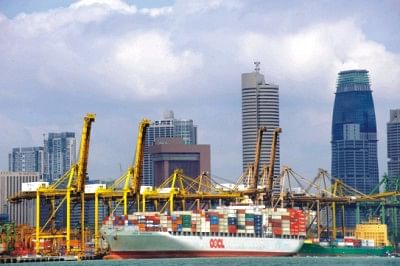Battling financial meltdown

The photo shows the Port of Singapore Authority container wharf in Singapore. Singapore's key exports in January fell by the largest amount on record, which provides further evidence of the city-state's deepening recession. Photo: AFP
Barely eight months ago, Asian governments were too preoccupied with curbing double-digit inflation as oil and commodity prices surged to unprecedented levels never seen in decades.
Central banks across Asia had to implement a series of interest rate hikes to rein in inflation.
Now, almost eight months later, Asia's economies are fighting a different kind of battle: recession. In a bid to stimulate their economies, Asian central banks have been cutting key interest rates with some rates already reaching zero levels, a sharp reversal from the tight monetary policies they adopted just months ago.
Japan
In January, Japan's parliament passed a 4.8 trillion yen (US$52.2 billion) stimulus plan that includes a cash payout of 12,000 yen (US$133) per Japanese taxpayer.
Japan is considering additional measures to shore up the economy with fresh spending, likely to top 10 trillion yen ($109 billion).
Japan's economy shrank by 12.7 percent in the fourth quarter, the steepest drop in 35 years amid an unprecedented collapse in exports and production in the world's second-biggest economy.
The drop in Japan's GDP, in the October-December period, far outpaces declines of 3.8 percent in the US and 1.2 percent in the Euro zone.
Japan's economy minister Kaoru Yosano says Japan now faces "the worst economic crisis" in the postwar era.
Japan's economy has now contracted for three straight quarters. Compared to the third quarter, GDP fell 3.3 percent. If that rate continued for a full year, the economy would contract 12.7 percent.
For 2008, Japan's GDP shrank 0.7 percentthe first decline in nine years.
Japan's exports plummeted a record 13.9 percent in the fourth quarter from the third quarter.
The IMF predicts Japan's economy will shrink 2.6 percent in 2009, outpacing the 2 percent overall decline it expects for advanced economies.
Singapore
Singapore's government has unveiled a multi-billion-dollar plan to boost spending and cut taxes in a bid to ease the worst recession in the city-state's history.
It also lowered corporate taxes, subsidised wages, guaranteed bank loans and spent more on infrastructure as part of the $20.5 billion (US$13.6 billion) stimulus package.
Singapore slipped into recession in the fourth quarter with real GDP contracting by 3.7 percent, following a decline of 0.2 percent in the preceding quarter.
"Our key objective in this package is to help Singaporeans keep their jobs," finance minister Tharman Shanmugaratnam said. "We have to expect many more jobs to be at risk this year."
The number of workers who lost their jobs last year soared to about 16,000, a five-year high.
Singapore's economy grew by 1.2 percent in 2008 as compared to a 7.7 percent growth in 2007.
Singapore has slashed its 2009 growth forecast, saying the economy could shrink as much as five percent as global demand for the country's exports collapses.
"Singapore's GDP growth is likely to be -5 to -2 percent in 2009 lower than the -2 to one percent growth range," Singapore's trade and industry ministry said.
The ruling People's Action Party is hoping the stimulus package's array of tax cuts and rebates will put cash in the pockets of consumers and resuscitate domestic demand.
The government will spend S$5.1 billion to help companies avoid layoffs, highlighted by a cut of the maximum corporate tax rate to 17 percent from 18 percent.
It also plans to subsidise 12 percent of the first $2,500 of each employee's monthly wages, hike cash handouts to low-income workers by 50 percent, and increase public sector hiring.
South Korea
South Korea's economy is slipping into recession with a sharp fall in exports and domestic consumption amid a global economic downturn.
Exports in January plunged by a record 32.8 percent from a year ago to $21.7 billion, sending the trade balance swinging to a deficit of $2.97 billion.
Korea's US$970 billion economy grew 2.5 percent in 2008, slowing from a 5 percent expansion a year earlier. Falling exports and wobbly financial markets have taken the steam out of Asia's fourth-largest economy, Korean officials said.
"The economic downturn is sharper than what we had predicted in mid-December, as exports, corporate profits, household income and domestic spending all are going downhill under the impact of the worldwide recession," said Choi Choon-shin, an official at the Bank of Korea.
In the fourth quarter, the economy contracted 5.6 percent, its worst performance since the Asian financial crisis 11 years ago.
The government, aiming for a 3 percent growth in 2009, has allocated about 140 trillion won (US$102 billion), or 15 percent of GDP, in liquidity injections, tax cuts and stimulus packages.
Taiwan
Taiwan's economy is projected to grow by only 2.12 percent in 2009 from an expected seven-year low of 1.87 percent in 2008.
Taiwan's final GDP figures for 2008 were to be released officially on February 19.
The economy was forecast to contract 1.73 percent in the fourth quarter of 2008 from the same period a year ago and another 0.31 percent in the first quarter of 2009, putting Taiwan's economy in official recession before expanding in the second, third and fourth quarters at 1.05 percent, 3.79 percent and 3.9 percent, respectively.
Many think tanks and economic research institutes are less optimistic about the prospects of Taiwan's economy, with many predicting near-zero growth rate for 2009.
Both Polaris Research Institute and the Academia Sinica put the 2009 GDP growth at less than 0.6 percent while the Taiwan Institute of Economic Research predicted a 0.89 percent expansion.
To boost domestic retail spending, President Ma Ying-jeou's administration has issued NT$85.7 billion (US$2.5 billion) worth of shopping vouchers to encourage consumers to spend. Each of the island's 23 million citizens, as well as foreign spouses, received NT$3,600 (US$105) worth of shopping vouchers. The government expects this programme alone to add 0.6 percent to this year's GDP.
The government also announced earlier an additional NT$200 billion on top of the current NT$500 billion stimulus package aimed at creating 150,000 new jobs in 2009 to combat Taiwan's rising unemployment rate, which climbed in December to its highest level since 2003.
(Other Asian countries will be covered in our next edition)

 For all latest news, follow The Daily Star's Google News channel.
For all latest news, follow The Daily Star's Google News channel. 



Comments